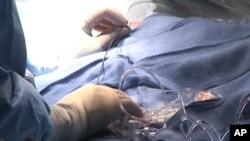A five-month-old baby born with a congenital heart defect undergoes a catheterization. The child is one of 36,000 babies born with a heart defect in the U.S. each year. Doctors are working on the infant's heart without performing open heart surgery. Cardiologists, such as Dr. Gerard Martin, say that within the last four years, doctors have learned how to perform more complex heart surgeries using catheters.
"...you can fix the heart without cuts, without invading the body, without pain," says Dr. Gerard Martin at Chlidnen's National Medical Center
But Dr. Martin says the long-term effectiveness of certain heart catheterization procedures is unclear.
So working with the American College of Cardiology, Dr. Martin is establishing a new database, known as the IMPACT registry. It records the progress of thousands of catheterization patients over the long-term.
Dr. Martin says, by monitoring the progress of multiple patients from infancy through adulthood, doctors can gather crucial evidence about the effectiveness of the procedures.
"...so we will know how we are really doing when we treat this condition," he adds. "Not in 20 children in one hospital, but in 2,000 children in a hundred hospitals."
Doctors use such databases to monitor the long-term well-being of patients undergoing many kinds of treatments.
EJ Davis, 4, was only three-months-old when he underwent open heart surgery.
His physician, Dr. Richard Jonas, still gets regular progress reports on EJ and thousands of other patients from a surgical registry.
"It's not just about surviving an operation and doing well for a few days or a few weeks. It's about decades and decades," says Dr. Jonas.
EJ's mother, Hope Davis, says she believes registries will help to improve the lives of children born with heart defects in the future.
"They'll have access to even better care and even more knowledge in science that will really help," she says. "One day maybe they'll only have to go through a few things that EJ had to go through."
Dr. Gerard Martin says the IMPACT registry for catheterization patients will help doctors to make decisions based on long-term evidence gathered from many hospitals. He says it will help future generations of patients live healthier lives.
US Doctors Create New Registry for Childhood Heart Problems

The IMPACT registry stands for 'Improving Pediatric and Adult Congenital Treatment' and includes information about patients who do not undergo open heart surgery. Often they undergo catheterization, a procedure which uses a catheter, or narrow tube, that is threaded into the heart through a blood vessel.







